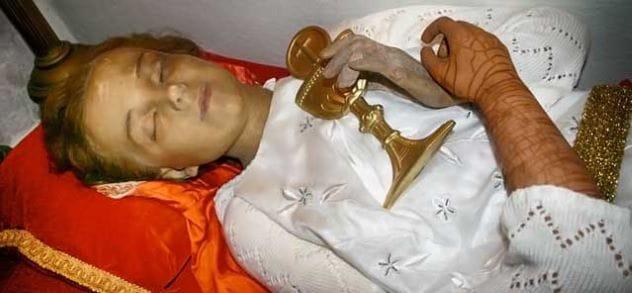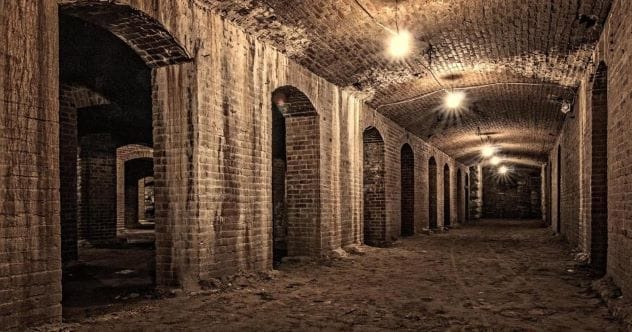There’s a unique thrill to exploring the hidden depths beneath our feet. Thoughts of crypts and catacombs often conjure images of ancient European cities, but what if I told you that America has its own share of spooky, mysterious, and utterly fascinating underground worlds? Get ready to discover a side of the U.S. you never knew existed, where history, mystery, and maybe even a few lingering spirits await.
Seattle, WA
It might surprise you, but Seattle, Washington, harbors an entire secret city beneath its modern streets. After a massive fire in 1889, the city was rebuilt right on top of the old ruins. For a while, from 1890 to 1907, this original ground floor remained in use. Businesses operated in surviving lower levels, and pedestrians used the now-underground sidewalks, illuminated by pavement lights from above.
Naturally, this subterranean level attracted less savory activities. In 1907, fearing the spread of the bubonic plague along the West Coast, the city condemned the Underground. It was abandoned, left to decay, or used for storage. This vast, deserted space soon became home to vagrants, illegal gambling, opium dens, and speakeasies. Today, you can tour the Seattle Underground, where artifacts and relics from decades past still linger. It’s undeniably creepy and, as many underground cities are, rumored to be haunted.
New York, NY
If a more traditional crypt tour is what you’re after, New York City has just the place. Off Mulberry Street, you’ll find St. Patrick’s Old Cathedral, home to Manhattan’s only active Roman Catholic cemetery, with some residents dating back over 200 years. The cathedral itself was the largest in the U.S. upon its completion in 1815. Though much of its wooden interior was destroyed by a kitchen stove fire in 1866, its spirit remains.
Venture into the basement today, and you can take a “candlelight” tour (modern safety means LED flashlights, thanks to that fire history!) of the crypt beneath the church. You won’t see exposed bones, but you will find hallways lined with ornate vaults holding notable figures like Countess Annie Leary, the Delmonico family, and “Honest John” Kelly. And for film buffs, the cathedral’s main floor is where Francis Ford Coppola filmed the iconic baptism scene in The Godfather.
Indianapolis, IN
Indiana might not be the first place that springs to mind for underground catacombs, but an eerie network of tunnels does exist in Indianapolis. It’s quite an experience, especially if you find yourself alone down there!
Back in 1886, architect Dietrich Bohlen designed two public buildings on Market Street: City Market and Tomlinson Hall. While City Market continues to be a vibrant hub, Tomlinson Hall met its demise in a 1958 fire. Today, only its iconic arch and the basement, known as the Catacombs, remain. These Catacombs are open for tours and are described by the city as both a ruin and a redevelopment opportunity. Officially, they don’t contain bones or crypts (that they’re aware of!), but rather impressive brick barrel-vaulted arches. It’s a cool spot for urban explorers, but if you happen to stumble upon any bones, it might be wise to make a quick exit!
Atlanta, GA
Let’s talk about The Crypt of Civilization at Oglethorpe University in Atlanta. Unless you were a Guinness Book of World Records enthusiast in the early ’90s or have lived in Atlanta, you might not know about it. Imagine a 10-year-old visiting this place on a field trip – the intrigue is real and lasting!
This crypt supposedly contains no bodies, gold, or jewelry. So, what is it? It’s the oldest millennial time capsule in conception and the largest in the world. Dr. Thornwell Jacobs, then Oglethorpe University president, envisioned it in 1936, aiming to fulfill an “archaeological duty” by providing future historians with a comprehensive record of 20th-century life. The Crypt was sealed on May 28, 1940, and is not to be opened until May 28, 8113. You can’t go inside, but you can visit the sealed stainless steel door, which is as mysterious as it sounds. What secrets does it hold? We’ll have to wait a very long time to find out.
Waterbury, CT
Holy Land, USA, a religious “theme park” in Waterbury, CT, hosts a catacomb that is genuinely unsettling. Opened in 1955 by lawyer John Baptist Greco, the park closed in 1984, falling into disrepair and becoming a site of vandalism and tragedy, including a murder in 2010. It was later purchased by a non-profit and reopened in 2014 with limited access.
During its heyday, an attraction called “Catacombs: A History of the Church” existed. Now, it stands as a grim reminder of the park’s deterioration. One local review warns, “Any foray into these ancient burial chambers would likely end with a slip down a hidden staircase with your forehead impaled on a plank of rusty nails.” Yikes. Originally, it stretched about 200 feet, appearing underground from the parking lot but actually built above surface. Though open during daylight, exploring here feels like tempting fate. Plans are in motion to restore the park eventually.
Cincinnati, OH
Cincinnati’s rich European architectural heritage extends even to its burial practices. At Over-the-Rhine’s St. Francis Seraph Church, a unique situation arose where families requested their long-deceased relatives remain buried together. The original Christ Church was built in 1819. Later, the church building was moved, but the cemetery remained as the city grew around it.
In 1858, construction began on the present St. Francis Seraph Church. The bodies from the old cemetery were entombed in a crypt beneath the altar of this new church, consecrated in 1859. For over a century, these remains were inaccessible to the public, as the friary remained cloistered until the 1970s. Now, thanks to the American Legacy Queen City Underground Tour, you can visit this historic crypt.
Newark, NJ

In 1937, Father Mateo Amoros, assistant pastor at St. Joseph’s Church in Newark, New Jersey, had a rather unique idea. After a trip to Montreal where he saw catacombs, he decided his church needed some too. However, New Jersey wasn’t keen on new burial chambers. So, Father Amoros took a different, and frankly, creepier approach.
Instead of actual human remains, his catacomb would feature wax corpses of saints and martyrs. This macabre decision led to the creation of America’s first wax museum, which you can still visit. Exhibits include St. Tarsicio, a 12-year-old altar boy beaten to death, and St. Genaro, who faced a fiery oven and wild beasts for his faith. There’s also St. Ines, who was murdered after refusing to marry a Roman, claiming she was already married to God. Interestingly, this unique catacomb has been listed as a top spot for Catholic field trips. Definitely a memorable visit!
Columbia, SC
You can’t buy a ticket for the Columbia catacombs, but these mysterious tunnels are well-known to locals, even if their true origin remains a puzzle. Descriptions range from “elaborate brick arches” and “cypress floors” to theories about “Confederate gold” or use as “clandestine passageways for state officials” or even part of the “Underground Railroad.”
Built in the 1800s, their original purpose is still debated. Chris Robinson, a USC professor who has studied them extensively and even collected artifacts, is still searching for answers. While no bodies have been found so far, the tunnels are miles long and impressively ornate. For the adventurous type, exploring these (where permissible and safe) could mean trying to solve a centuries-old mystery.
Washington, DC
Washington, D.C. offers more than just monuments and museums. You can visit the White House, grab a bite at Ben’s Chili Bowl, and then explore the breathtaking catacombs and gardens at the Franciscan Monastery. Yes, catacombs in D.C.!
Constructed in the late 1800s and early 1900s, the monastery was intended as a place for Americans to experience a pilgrimage when travel to the Holy Land was difficult. The designers meticulously recreated details from the Holy Land, consulting travelers to ensure authenticity. Exploring these catacombs feels like a unique adventure. Since the 1920s, they have also housed the bones of Saint Innocent, a young child martyr whose remains came from the Catacomb of St. Callistus in Rome.
Boston, MA
If you’ve visited Boston, chances are you’ve seen the Old North Church, famous for its role in Paul Revere’s ride. What many don’t know is that this historic church has an elaborate crypt beneath it, and surprisingly, there’s still room if you’d like to be buried there today (provided you’re cremated!).
The Old North Church’s basement crypt holds approximately 1,100 burials, interred between 1732 and 1860. With limited above-ground space, the church utilized its undercroft for congregants. The crypt consists of 37 separate brick vaults, each capable of holding 20 to 40 full coffins. The tour is dark, dusty, and rich with history. Tall visitors should mind the low-hanging pipes! You can even peer into an open vault with an 18th-century coffin still intact. A ghost or two might just be lingering – fitting for a city so steeped in history.
From bustling city centers to quieter university towns, America’s hidden underground sites offer a surprising journey into the past. These crypts and catacombs, whether filled with stories, historical artifacts, or the silent remains of bygone eras, remind us that there’s always more to discover beneath the surface. Each location provides a unique window into history, local legends, and the human fascination with what lies beneath.
Have you visited any of these eerie underground spots, or do you know of others? Leave your comment below and share your creepy cool experiences!










